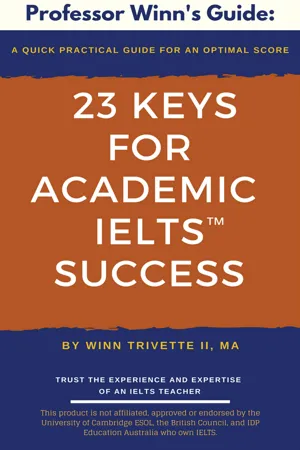![]()
Chapter 1: The Starting Point
KEY #1: DO A REALISTIC assessment of your English level.
When I prepare my students for the IELTS, I take the following approach: 1) 50% English and 2) 50% IELTS skills.
Yes. Your IELTS preparation should be a fine balance between sharpening your English and test skills.
Ideally, you should focus solely on improving your language skills, but the reality is otherwise.
Do a frank evaluation of your English skills right now.
What are your strongest and weakest areas of English?
Don’t make the common mistake of your strong points at the expense of your weak ones. You know it is the weak skills that lower your score.
By this stage of your English career, you probably have a good idea of your English power.
Presenting the IELTS is an important event in your professional career. You should be the best prepared to make the most of your moment!
Your progress from the time you register for the IELTS to test day depends on several factors:
**your native language
**your current level of English fluency
**your educational achievement
**your commitment to work with a native instructor
**your goals and motivation
Besides your native language, the others factors are well within your control to improve before the exam.
Everyone obtains language skills at different rates.
Naturally, if you are comfortable using natural English, you are going to have an easier time preparing for the exam.
Above all, do a realistic analysis of your current level of English fluency.
Key #2: Focus on English Fluency.
Just like at school or the office, as mentioned above, natural English also should be your goal on the IELTS.
Use English effortlessly in your IELTS preparation in particular and language acquisition in general.
You should be more relaxed.
During your IELTS preparation, you can learn key pieces of language, and test tactics to conquer the exam for a higher score.
Key #3: Develop a study plan.
By failing to prepare, you are preparing to fail. - Benjamin Franklin, US inventor and statesman.
Every worthwhile endeavor starts with a plan.
I suggest starting your IELTS test prep three (3) months before the test day to achieve a high score.
Determine how many hours a day you have to practice each day.
In particular, consider study “bites” of 45-minute sessions for each exercise.
Focus on your weaknesses, but also review your strengths.
Take a whole 10 minutes of rest time between study sessions to do whatever you want to recharge.
Key #4: Increase your English exposure.
Take every opportunity to expose yourself to English.
Listen to radio broadcasts and TV programs.
Read English-language newspapers like nytimes.com, washingtonpost.com, or the Economist.com magazine.
These periodicals use a high level of English – excellent preparation for Academic IELTS reading.
Even more, read an English text throughout your preparation of your choice - either non-fiction or fiction.
Speak with English-speaking friends to maintain your fluency and natural comfort speaking English on a variety of topics.
Do an extra English activity every day apart from your test preparation.
Watch a television comedy like Friends or Big Bang Theory.
Listen to a podcast to test your comprehension and gain familiarity with different accents.
One of my favorite podcasts is 6 Minutes English by the BBC.
Above all, become more familiar with English anyway possible so you use it naturally on exam day.
Key #5: Answer the question.
Two golden rules determine whether you achieve a high score or not.
One – always answer the question you are asked.
Two - give the test officials the type of answer they want.
For example, here are two instructions for the Listening Section.
NO MORE THAN THREE WORDS OR A NUMBER for each answer
NO MORE THAN TWO WORDS OR A NUMBER
For example, the Speaking Section’s “Long Turn” (Part 2) gives you a topic and three to four questions to answer in your 1-2 minutes.
Make sure you address each question or you will lose points.
Thus, follow the directions precisely to notch a high Academic IELTS score!
Key #6: If possible, I strongly suggest you work with a native English instructor with IELTS prep experience.
I don’t say this just because I offer a 1-on-1 IELTS preparation course.
Do not think of the expense of hiring a native English instructor.
Instead, think of the expense if you don’t achieve your optimal score on the first test!
I remember helping students who did not achieve their high score on the first exam and finally sought an experienced native English IELTS teacher to help them.
Besides, IELTS is an expensive test.
While you can retake the IELTS test as many times as you like, why not just do it right the first time.
That is – invest in a preparation course to boost your English and IELTS skills.
Academic IELTS test candidates are highly motivated in my experience. They have clear cut goals.
Spend about 3 hours a week working with your IELTS prep teacher.
Three main benefits come...




